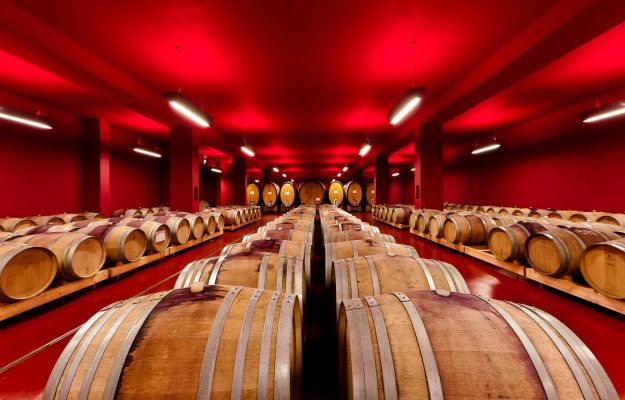Spending resources well, both those coming from Europe and those already available to Italy, to help Italian wine and catering get through the Pandemic. For instance, the CMO Promotion funds, or those from the Recovery Fund could also be spent within the EU, and not only in third countries. Perhaps not putting into effect seemingly senseless measures, such as closing restaurants at 11pm that appear likely from rumors about the next Decree, which should be announced in a few days, to limit the growth of infections from Covid-19. We must look beyond the situation, however difficult it may be, towards a long-term strategic vision, where companies and institutions must play as a team to encourage the innovation and digitalization processes that the Covid-19 emergency has accelerated. We have indeed seen a boom in e-commerce as well as web-based meetings and wine tastings, which occurred during lock-down, and are still totally active. These are the messages that wine companies, supply chain representatives and institutions have sent from “Milano Wine Wee”, which puts Milan at the very center of Italian wine, from October 5th to 11th, and is a tangible example of this new hybrid soul, physical and digital, of wine events.
The participants include the Minister of Agriculture, Teresa Bellanova, Undersecretary for Foreign Affairs, Manlio Di Stefano, President of the foreign trade institute, ICE, Carlo Ferro, President of Confagricoltura, Massimiliano Giansanti, President of FIPE, Enrico Stoppani; wine producers and managers, such as Riccardo Pasqua (Pasqua Vigneti e Cantine), Beniamino Garofalo (Santa Margherita), Ernesto Abbona (Marchesi di Barolo and FEDERVINI resident), Riccardo Ricci Curbastro (Riccicurbastro and FEDERDOC president), Arturo Ziliani (Berlucchi) and Sarah Serena (Montelvini); leaders of consortia, such as Luca Giavi, director of the Prosecco Consortium DOC, Giuseppe Salvioni, CEO of the Franciacorta Consortium, Innocente Nardi, President of the Prosecco DOCG Consortium and Carlo Veronese, CEO of the Oltrepò Pavese Consortium, and also European representatives such as the MEP Paolo De Castro and the secretary of CEEV (Comité Européen des Entreprises Vins) Ignacio Sancez Recarte. The moderator is the journalist Luciano Ferraro of the daily newspaper, “Corriere della Sera”, and all confirmed they are aware that the situation is challenging and still very uncertain, but that there are resources and possibilities to face it, as long as everyone does their part.
“We are working in the European Union, and there are a lot of resources on the way for European agriculture. We are definitely aware that the situation is complicated and we hope for positive news, from the key markets Europe and the US, as well as the United Kingdom, where we are following the Brexit issue very closely”, said Paolo De Castro. He then yielded the floor to Recarte, who emphasized how, “in view of a no deal on Brexit, we are advising companies to ask importers to increase their stocks, but it is not a simple operation”. Beyond this, we need a vision for the future, as Beniamino Garofalo, CEO of the Santa Margherita Group commented. “Whether there are few or ample resources available is a relative problem, what we need to understand is where and how to spend them. The world is changing and we need to devise a new approach to a market that is moving more and more towards business to consumer, i.e., direct contact with the consumer. So, companies need to strengthen their analytical and digital skills, because this is where the future will be. There is also the issue of size, because we need even more aggregation. The CMO has provided a bit in this direction, and the companies have worked with the support, but even more must be done; otherwise, it will be very difficult to compete with other countries”. Luca Giavi, director of the Prosecco Consortium, added his thoughts, “the resources are there, but we need to think about the European model pushing towards aggregation, and making more system than we actually have in Italy. Listening to the market is essential; interpreting its trends is crucial. We, for instance, did it by launching Prosecco Rosè, which will soon be tested on the market. Our production is 10-15 million bottles, which could reach 40 million when it is fully operational”. What is certain is that courage and foresight are necessary, because “we had seen some signs of recovery in the summer, but now uncertainty has returned”, stressed Riccardo Pasqua, at Pasqua Vigneti e Cantine, “and it is not easy to predict what may happen in our business. Nevertheless, big opportunities lie before us, despite the enormous challenges in this strange moment. Through digitalization and investing in new talents and managers, we will get closer to the consumers in the next 30 years faster, by rejuvenating communication, and using digital platforms that are still not used very much in the wine world. We have the opportunity to accelerate this process. And, invest even more in sustainability, in which the European Union and Italy must support us. It is clear that the economic situation is difficult, importers around the world are waiting, keeping their warehouse stocks down, but we must look forward with optimism. “Aggregation and sustainability are the key issues also according to Giuseppe Salvioni, at Consorzio del Franciacorta. “This is what we have been working on for years, our wineries are all small to the world, and as a consortium we are working on the markets to make the denomination known. We have been investing in sustainability for a long time, so much so that our appellation has the highest percentage of organic vineyards, which definitely makes us more competitive on many markets. Europe operates on a positive level, in terms of support and funds, but we need to simplify the rules. Sometimes they are so complicated that the smaller consortia and less structured companies give up trying to access resources, risking that the European Union cuts funds”. “I think Europe is doing too much, and we need to totally rethink a country system, starting with infrastructures and schools”, challenged Arturo Ziliani, at the helm of Berlucchi, who added, “simplifying bureaucracy is a necessity, but it is imperative to understand whether politics is influencing bureaucracy or the other way around. This situation in the wine world is getting worse year by year”. In any case, Italian producers are looking to the future, “because this situation has shown that we are prepared, not improvising, and through combining our skills with the value of our agriculture, the beauty of our landscape and culture, we can be at the top of the world for appeal. Of course, we must have useful tools available, and, in the situation we are experiencing right now, it would be appropriate to use CMO funds also in the European Union, which is a fundamental market, and not only in third countries”, commented Sarah Serena of Montelvini. Innocente Nardi, at the helm of the Prosecco DOCG Consortium, said, “first of all, we must re-launch the Italy brand as a whole. We need a major incoming project especially for wine because the real Italian wine fairs are the territories, to fully understand that we must turn to higher quality and value of the products, and not larger quantities”.
“We must make the already existing resources more accessible, and I also hope that resources will be re-allocated for measures that were used less than expected, like the green harvest. We need excellent coordination between Regions, and to share national strategies, not local, as they do not bring results, but rather dispersion of resources. The main players are the wine companies, and we must give them the tools to use European and Italian resources”, added Ernesto Abbona, at the helm of Unione Italiana Vini (UIV) and Marchesi di Barolo, while Riccardo Ricci Curbastro, at the helm of the family winery and FEDERDOC, urged, as soon as possible, “a Wine Table on which we can expect a targeted, common direction of initiatives. Each of us must do his part. Companies are on the market every day, and they should be at that table, just like the consortia, which also promote. But we need more streamlining, not three State-Region conferences to decide how to spend funds. We have been waiting for weeks to re-allocate 60 million euros, unused, for distillation, which if we don't spend by December, will be lost”.
In addition to everything else in Italy now, there is much apprehension about the new anti-Covid-19 measures the Government is studying. “One of these measures that we consider useless and harmful provides for closing bars and restaurants early. We are fighting hard against it because it would penalize the sector, which is already heavily affected, plus create an out-of-control nightlife in the streets”, said the president of FIPE, Lino Stoppani. From abroad the “Export Pact”, of which ICE is one of the main players would be a really big help, said President Carlo Ferro. “It is an open construction site, we have many initiatives that ICE did not have before, such as the campaign for the "nation brand", support for trade fairs, e-commerce and training digital experts.
Regarding e-commerce, for instance, we are working hard to help companies access an increasingly essential channel. At the beginning of 2019, we had established only two agreements with global platforms, now there are 14 and we will reach 24 by the end of the year, involving players such as Amazon and Alibaba. Further, as many as16 of these platforms concern wine. And, we will soon be closing an agreement with Tannico (which recently has been acquired by the Campari Group, ed.), to bring Italian wine to 18 countries around the world, at no cost to businesses. In addition, we are working on supporting mini-fairs, national events that we wanted to bring up to the international level. For instance, Wine2Wine, where we have put resources similar to those for Vinitaly, especially for incoming and producing an international event. But everyone needs to do his part. Events like Milan Wine Week are a major commitment to find the balance between physical and digital presence, and in this context our off-19s are very active. We have created 2.000 contacts with foreign professionals for Milan Wine Week”.
Massimiliano Giansanti, president of Confagricoltura, called the Government into question by demanding “answers for an agricultural sector that has proved its value over the past few months, and wine is at the forefront, which, considering the many difficulties, has limited its losses”. The Undersecretary for Foreign Affairs, Manlio di Stefano ensures he is “constantly listening to the entire supply chain, through the Wine Table that we have already set up in view of the negotiation for the Export Pact, which will be a model to follow”. Minister Bellanova said, “Milan is sending a message of restarting, of setting up innovative systems and tools that digital can offer. We have done a lot of work for wine, but there is still a lot more to do. We have published the decree for the CMO Wine Promotion 2021, which makes 100 million euros available, opening up to large-scale retail and HORECA initiatives as the supply chain requested, and favoring consortia to make aggregation. We have extended the “restaurant decree”, or 600 million euros to purchase PDO and PGI products, also to farmhouses offering food and catering. The decree is coming soon, and we will evaluate whether to extend the measure to 2021. Instead, out of the 60 million euros not used for the green harvest, we have used 50 million euros for tax exemptions, and 10 million euros will be used to support PDO and PGI productions. These resources must be spent by December 31, 2020, while we will discuss subsequent interventions in our budget law. Regarding the Recovery Fund, I can say that agriculture will be the star, and that we will have to push for sustainability, in its three forms: environmental, social and economic. If one is missing, the others cannot stand alone, starting with economy. Italy, though, is ahead of the others and can set the course for Europe. We need system strategies for agriculture, and we must spend and spend well. This time, if we make a mistake the future of Italian agriculture will pay the consequences”.
Copyright © 2000/2025
Contatti: info@winenews.it
Seguici anche su Twitter: @WineNewsIt
Seguici anche su Facebook: @winenewsit
Questo articolo è tratto dall'archivio di WineNews - Tutti i diritti riservati - Copyright © 2000/2025

























































































































































































